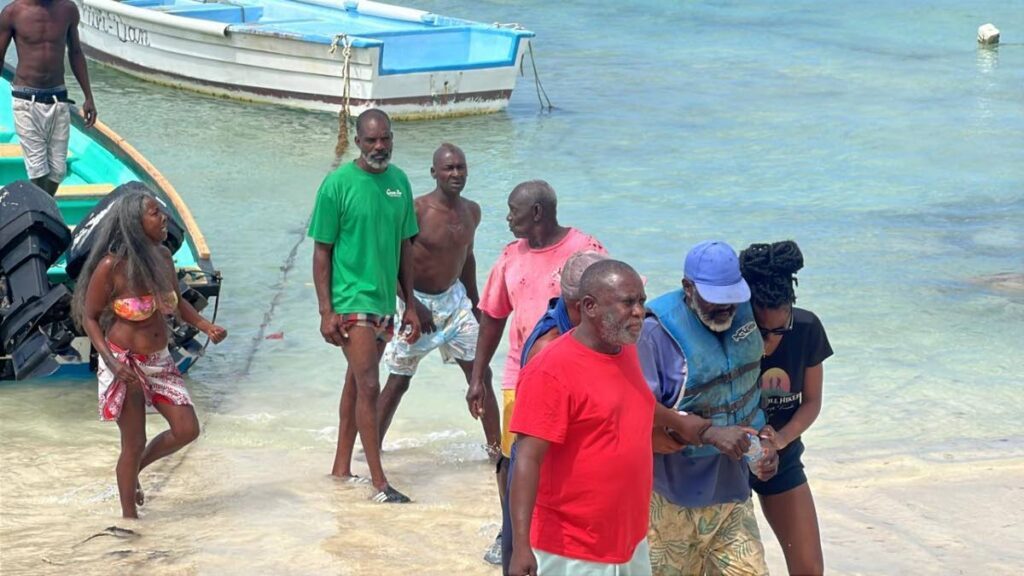Braving the seas so you can eat fish

I do not buy fish, therefore I am unaware of the cost. But recently, when a friend told me that fish is $50 a pound in Trinidad and $40 a pound in Tobago, I commented that it sounds costly, but the price, in part, probably speaks for all that fishermen endure when they are out at sea.
No doubt all fishermen have hair-raising tales of adventure; being out in the deep blue unknown, anything is possible.
Recently two Tobago fishermen, Albert “BB” James and Junior “Flehbeh” Thorne, were lost at sea for four days, after the engine of their boat failed and they began to drift.
Knowing that other fishermen would eventually come to the area to which they had gone to set their fishpots, they tied their vessel to the pots to prevent further drifting. Four days later, men in another fishing boat entering the area were able to rescue them,
On their return to Pigeon Point, they were met by scores of grateful and euphoric loved ones and well-wishers, celebrating what is touted by some as a miracle.
In an interview with the media, the wife of one of the fishermen, Albert James, was overly grateful.
“The best catch is my husband that come back to shore,” she told the media in a video. “The best catch I could have in life ... I don't care how much fish they have out there. The best catch for me is that they are safe and that they are on dry land presently."
Profusely thanking those in her community who had supported and prayed with her and acted as "crutches," she told the interviewer: "There is love in this land after all."
Meanwhile, her husband, passing by one of the cameras on his way to the ambulance, was overheard saying, “I never give up on my Jesus, boy.”

While chatting with a fisherman recently, I asked him if he had ever experienced anything really dangerous while out at sea in his pirogue.
His hair-raising tales were the stuff of local action movies – having to bail water rapidly from his boat after it crashed into rocks at night, then miraculously drifting into Parlatuvier...losing engine power and drifting out to sea before being rescued by a passing pirogue...taking a visitor on a fishing expedition and encountering a huge wave that had the boat high up and vertical (he demonstrated this by moving his hand/pirogue up the straight side of a jug/the wave), while he held for dear life to the engine and the terrified visitor on the floor held on to the seat.
“When you out there it’s only you and God,” he told me. “No one else.”
I asked an acquaintance, a former fisherman, what he felt that those in the industry required for greater protection and preparation on open waters.
His answers: satellite phone, extra battery for GPS and radio. Also certain tools for the engine and lots of water for hydration. A certain level of experience is also vital.
The idea of "anything can happen" out on the ocean brings to mind the recent incident involving the father-and-son kayakers off the coast of Chile. A camera fixed to the back of the father’s kayak recorded the moment in which a humpback whale swallowed his son and his kayak and spat them out seconds later – thankfully, his son was alive and uninjured.
Admittedly, as we live in a world of increasingly fake news and video scenarios created by AI, I found myself wondering if the footage was real, especially as (in the video) the water hardly seemed to move, despite the fact that such a large animal was rising up from the depths.
Furthermore, the footage captured from the father’s kayak seemed consistently steady and not disturbed by wave movement.
On googling to find videos showing how water moves when humpback whales rise up, I noticed that, amazingly, not much wave action was visible. In googling I also learned that humpback whales do not have teeth and that their throats are the size of the average human fist – two factors that saved the kayaker from being crunched and swallowed further as a snack.
For multiple reasons, I have great admiration for anyone who heads out to sea daily in a pirogue. It is something I could/would never do.
Think about their bravery and hard work whenever next you eat a piece of locally caught fish.

Comments
"Braving the seas so you can eat fish"